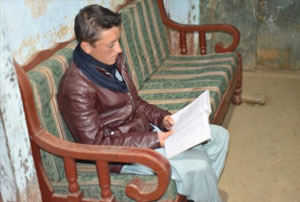It is past sunset in Barra Banda village, District Torghar, Khyber Pakhtunkhwa. Each house is glowing with a luminous bulb, which makes this small settlement of 55 households look like a constellation of stars with dark mountains in the background. Aslam Khan, a student of seventh grade, lives in one of these star-like houses. He is doing his homework sitting under the bulb in his house and is optimistic about getting good grades in the upcoming exams. This is a completely different situation from a year ago when he was struggling with his studies.
His daily commute between school was 18 kilometers which took an entire day, leaving no time for him to study during the daylight while there was no electricity to light up a bulb after sunset. Some nights, his mother would light a candle or a kerosene lamp for his homework. The unpleasant smell and smoke from the lamp coupled with travel fatigue would make him sick, often forcing him to skip his classes. He recalls those days as “tiring and exhausting” with “headaches and strained eyes” due to the smell of kerosene.

Torghar is not fully connected to the national grid and many of its parts including Barra Banda plunge into darkness the moment sun sets in the mountains. Locals burn wood or kerosene for lighting and warming their houses, especially during extremely chilly winter nights. Fueling this fire also puts additional strains on their budgets. Nearly 500 villagers of Barra Banda including Aslam’s family had a similar fate. Every family would gather in one room to save money on fuel.
The darkness not only left the villagers in darkness but also pushed them towards backwardness by making it hard for their children to study well. The byproduct of the lighting i.e., smoke, negatively impacted the villagers’ health as well as the environment.
This changed with the arrival of Society for Human & Environmental Development (SHED). The organization with financial support from the Ambassador’s Fund Grants Program (AFGP) provided each household with a solar system, and a fuel-efficient stove. They also organized orientation sessions on the installation and daily maintenance of stoves and the solar system. Additionally, they trained 20 young men on repairing solar systems.
This brought about remarkable change in the lives of the villagers. Aslam can do his homework in the light of solar bulbs after the sunset. He excitedly tells, “I complete my homework on time, which saves me from being scolded by teachers and helps me earn better grades than before.”

Not only Aslam is cheerful but his whole family is satisfied with this change. His grandfather enjoys offering his prayers and eating dinner in the light. His mother is pleased with the smokeless house. His father is saving the fuel and medication costs.
Interestingly, the whole village has benefited from this innovative alternative energy solutions project; every household in the village has voluntarily installed one solar bulb in their streets. This means that extra illumination would help prevent crime and lighting would assist in creating a pleasant and safe environment for children and the adults.
As Barra Banda is the only village in the vicinity that has electricity, many people from the surrounding villages visit to see the solar-lit homes and streets. SHED has received requests from at least four villages to introduce a similar project.




















